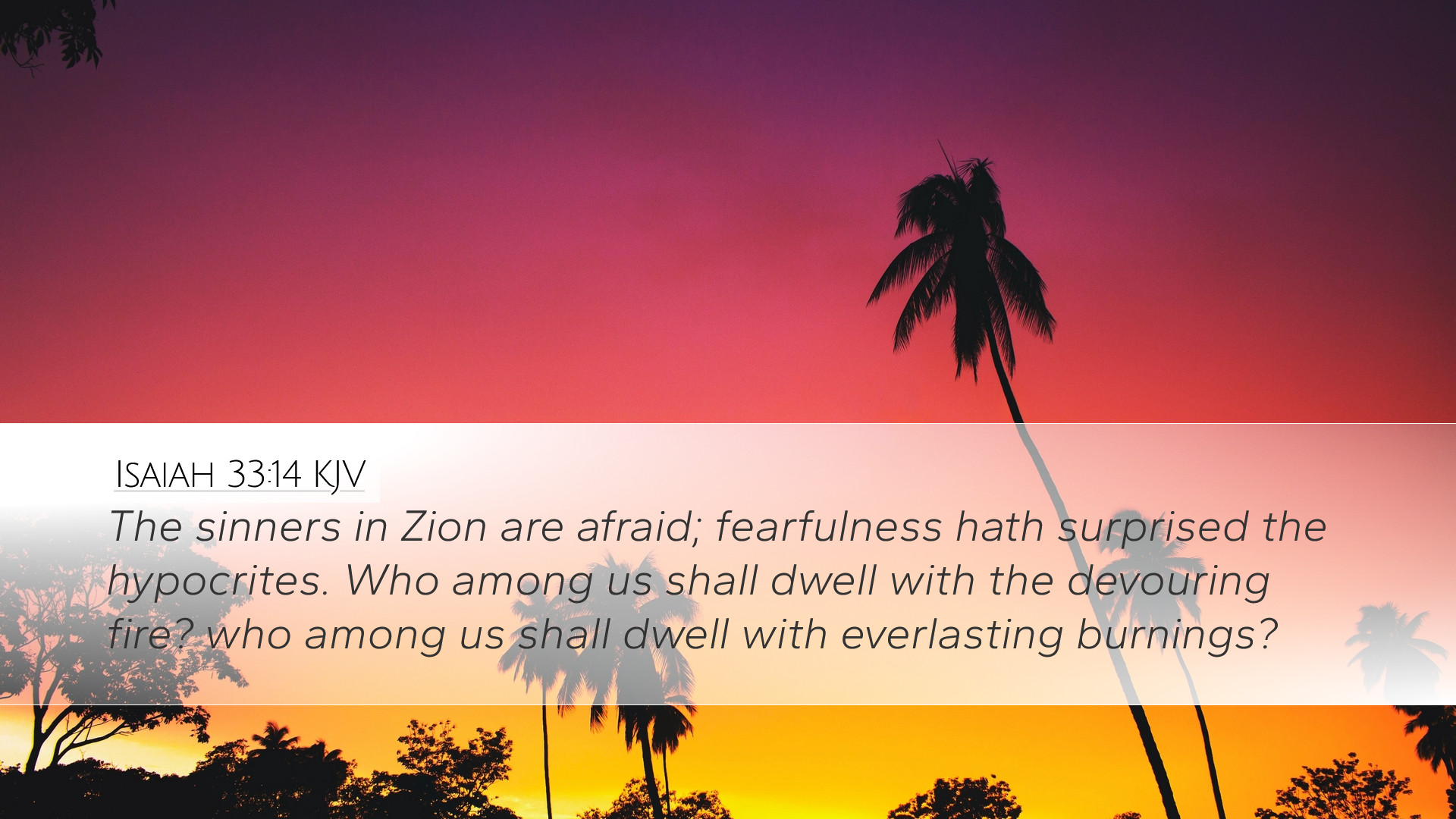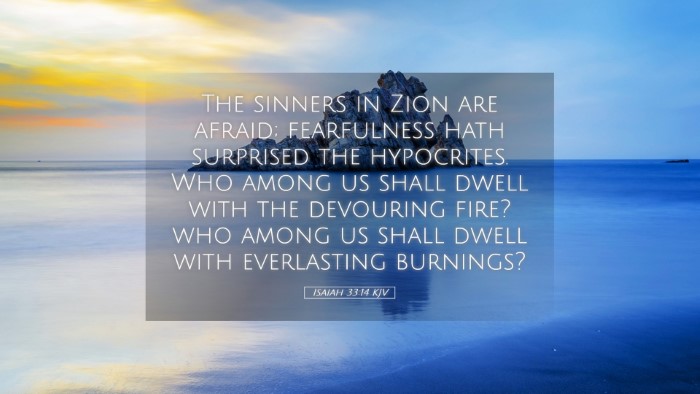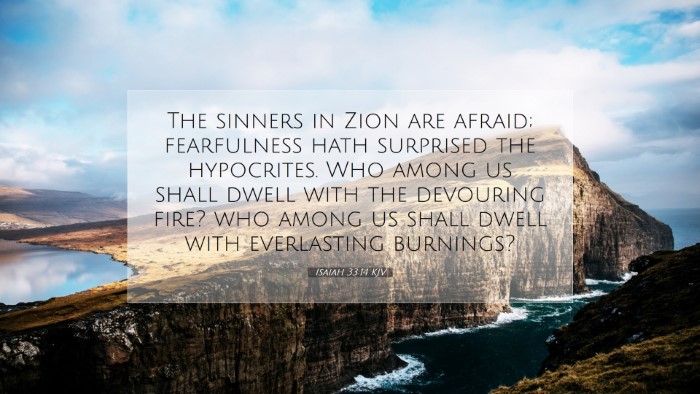Commentary on Isaiah 33:14
Verse Text: "The sinners in Zion are afraid; fearfulness hath surprised the hypocrites. Who among us shall dwell with the devouring fire? Who among us shall dwell with everlasting burnings?"
Introduction
This verse from Isaiah encapsulates a profound moment of reflection on divine judgment and holiness. It addresses the sinners and hypocrites in Zion, presenting a stark contrast between the righteous and the unrighteous. Through insights from classic public domain commentaries, we will explore the theological implications, historical context, and practical applications of this verse for modern readers.
Context and Historical Background
The book of Isaiah is situated in a context of impending judgment due to the moral decay and sinfulness prevalent in Israel. Isaiah prophesies during a time when the people of Israel face threats from foreign nations and also grapple with their transgressions before God. The mention of "Zion" signifies the city of God, a place of divine habitation and representation of God's chosen people.
Matthew Henry’s Insights
Matthew Henry emphasizes that the fear expressed among the sinners in Zion reflects the anxiety and terror that can accompany awareness of one's sinfulness before a holy God. He notes:
- Fearfulness as a Response: Fear is a natural response of those who recognize their standing before God in light of their unworthiness. The "fearfulness" that surprises hypocrites stems from their conscience stricken by the awareness of impending judgment.
- Hypocrisy Explored: Henry draws attention to the idea that hypocrites—those who feign righteousness—will find their façade crumbling as they cannot abide the presence of divine purity. In facing God’s holiness, their deceit will become evident.
Albert Barnes’ Insights
Albert Barnes elaborates on the metaphor of "devouring fire" and "everlasting burnings" as an allusion to God's judgment and holiness.
- Devouring Fire: He interprets the "devouring fire" as a symbol of God’s consuming judgment against sin, which is unyielding and righteous. This image serves to evoke a sense of divine justice that ultimately cannot be ignored.
- Reassurance for the Righteous: Barnes contrasts the fate of the unrighteous with that of the righteous. For the righteous, God's fire functions as a purifying entity rather than a destructive one, highlighting the need for true repentance and aim toward holiness.
Adam Clarke’s Insights
Adam Clarke adds a doctrinal perspective, stressing the seriousness of sin and the reality of judgment:
- Judicial Fear: Clarke points out that the fear felt by those in Zion is not just instinctive but is a judicial fear—a stark realization that their actions have consequences before a holy God.
- Questions of Dwellers in Fire: The rhetorical questions posed in the latter part of the verse ("Who among us shall dwell with the devouring fire?") highlight a universal truth: that no one can stand in the presence of God's judgment without being purified.
Theological Implications
This single verse raises critical theological discussions about sin, judgment, and the character of God:
- The Nature of Sin: It brings to fore the immensity of sin and its repercussions—sinners are terrified at the thought of divine judgment. Understanding sin in light of a righteous God encourages believers to seek genuine repentance.
- Divine Holiness: The imagery of fire portrays God’s holiness that requires reverence. The concept of the "everlasting burnings" suggests a persistent and unyielding separation for those who choose to reject God.
- Call to Righteousness: The fear of coming judgment can serve as a catalyst for change, urging individuals, particularly spiritual leaders, to guide others toward the righteousness that allows them to dwell with God peacefully.
Practical Applications
For pastors, students, theologians, and Bible scholars, the insights gleaned from this verse can provide substantial material for teaching, preaching, and personal reflection:
- Preaching on Judgment: Pastors can use this verse as a launching point for sermons on the nature of God’s judgment and the need for repentance, emphasizing the urgency of turning from sin.
- Encouragement for the Contrite: This verse can be a source of comfort for believers who may feel consumed by the fear of judgment, reminding them that genuine repentance can lead to purification and fellowship with God.
- Discussion in Theological Studies: Scholars can analyze the interplay of fear and repentance in the spiritual journey, exploring how fear of judgment motivates ethical living.
Conclusion
Isaiah 33:14 serves as both a warning and an invitation. It challenges individuals to confront their spiritual state while encouraging them to embrace the purification that comes from acknowledging their need for God's grace. The combined insights from Matthew Henry, Albert Barnes, and Adam Clarke provide a rich tapestry of understanding that underscores the seriousness of divine judgment and the transformative power of turning toward righteousness.


